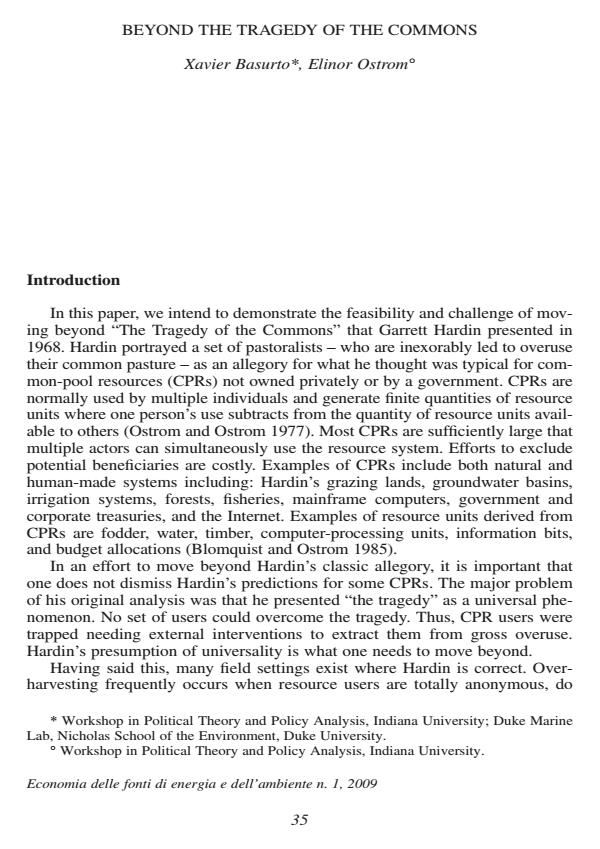Beyond the tragedy of the Commons
Journal title ECONOMIA DELLE FONTI DI ENERGIA E DELL’AMBIENTE
Author/s Xavier Basurto, Elinor Ostrom
Publishing Year 2009 Issue 2009/1
Language English Pages 26 P. 35-60 File size 670 KB
DOI 10.3280/EFE2009-001004
DOI is like a bar code for intellectual property: to have more infomation
click here
Below, you can see the article first page
If you want to buy this article in PDF format, you can do it, following the instructions to buy download credits

FrancoAngeli is member of Publishers International Linking Association, Inc (PILA), a not-for-profit association which run the CrossRef service enabling links to and from online scholarly content.
<em>Beyond the Tragedy of the Commons</em> - To move beyond Hardin’s tragedy of the commons, it is fundamental to avoid falling into either of two analytical and policy traps: deriving and recommending "panaceas" or asserting "my case is unique". We can move beyond both traps by self-consciously building diagnostic theory to help unpack and understand the complex interrelationship between social and biophysical factors at different levels of analysis. We need to look for commonalities and differences across studies. This understanding will be augmented if the rich detail produced from case studies is used together with theory to find patterned structures among cases. In this paper, we briefly illustrate important steps of how we can go about diagnosing the emergence and sustainability of self-organization in the fishing context of the Gulf of California, Mexico. By doing so, we are able to move away from the universality proposed by Hardin and understand how two out of three fisheries were able to successfully self-organize, and why one of them continues to be robust over time. <br/><br/>Keywords: sustainable development; renewable resources fisheries; renewable resources commons <br/><br/>JEL classifications: QO1; Q20; D70 <br/><br/>Parole chiave: sviluppo sostenibile; risorse rinnovabili; zone di pesca; proprietà comuni
- A Comparative Institutional Arrangements Analysis of Complex Commons: The Case of Two Marine Protected Areas on the Black Sea Coast Nona Nenovska, in Society & Natural Resources /2026 pp.1
DOI: 10.1080/08941920.2025.2528217 - Resilience and collapse of artisanal fisheries: a system dynamics analysis of a shellfish fishery in the Gulf of California, Mexico Newton Bueno, Xavier Basurto, in Sustainability Science /2009 pp.139
DOI: 10.1007/s11625-009-0087-z - Embracing thresholds for better environmental management Ryan P. Kelly, Ashley L. Erickson, Lindley A. Mease, Willow Battista, John N. Kittinger, Rod Fujita, in Philosophical Transactions of the Royal Society B: Biological Sciences /2015 pp.20130276
DOI: 10.1098/rstb.2013.0276 - Pescatourism’s contribution to the management effectiveness of the Marine Protected Area (MPA) of “Taza” (Algeria, Southwestern Mediterranean) Salah Eddine Guedri, Amina Hana Djabi, Ibrahim Yahiaoui, in Marine Policy 106581/2025 pp.106581
DOI: 10.1016/j.marpol.2024.106581 - Experimental removal of the invasive peacock hind (roi) Cephalopholis argus, in Puakō, Hawai‘i: methods for assessing and managing marine invasive species J Giddens, AM Friedlander, E Conklin, C Wiggins, K Stamoulis, MK Donovan, in Marine Ecology Progress Series /2014 pp.209
DOI: 10.3354/meps10919 - Navigating Our Way to Solutions in Marine Conservation Xavier Basurto, pp.155 (ISBN:978-1-80511-254-9)
- A property rights schema for cultural flows in the Murray Darling Basin, Australia Siobhan Davies, Graham R. Marshall, Malcolm Ridges, in Australasian Journal of Environmental Management /2023 pp.393
DOI: 10.1080/14486563.2023.2281562 - Factors driving the implementation of fishery reforms Shireen Rahimi, Steven D. Gaines, Stefan Gelcich, Robert Deacon, Dan Ovando, in Marine Policy /2016 pp.222
DOI: 10.1016/j.marpol.2016.06.005 - Combining social network analysis and ethnography to better understand fishers’ organization and promote sustainable small-scale fisheries in St. Croix, US Virgin Islands Cynthia A. Grace-McCaskey, Maria C. Ramos, Anja Sjostrom, Sarah E. Page, in Marine Policy 105573/2023 pp.105573
DOI: 10.1016/j.marpol.2023.105573 - Balancing ecology and economy: The role of Pescatourism in advancing sustainable blue economy strategy in Algeria's coastal regions Salah Eddine Guedri, Ibrahim Yahiaoui, Said Chaouki Chakour, Abdelkader Douaoui, Amina Hana Djabi, Ahmed Ziane, Qiang Zhang, in Marine Pollution Bulletin 118096/2025 pp.118096
DOI: 10.1016/j.marpolbul.2025.118096 - Building an integrated analytical framework: a new methodology to analysing social-ecological systems Sirak R. Gari, Alice Newton, John D. Icely, in Journal of Environmental Planning and Management /2024 pp.1
DOI: 10.1080/09640568.2024.2423780 - Par-delà les marchés et les États Elinor Ostrom, Éloi Laurent, in Revue de l'OFCE /2012 pp.13
DOI: 10.3917/reof.120.0013 - Causal pathways in the political economy of climate adaptation: Winners and losers in Turkana, Kenya solar mini-grid projects Jake Lomax, Matthew Osborne, Vane Aminga, Naho Mirumachi, Oliver Johnson, in Energy Research & Social Science 102296/2021 pp.102296
DOI: 10.1016/j.erss.2021.102296 - Evaluating Environment in International Development Andy Rowe, pp.46 (ISBN:9781003094821)
- Hardin’s legacy as a need for a ‘commoning turn’ in planning Sokratis Seitanidis, Giorgos Gritzas, in Planning Theory /2022 pp.354
DOI: 10.1177/14730952221074873 - Sengwer Indigenous Environmental Knowledge and the Management of Cherang'any Forest Resources, Elgeyo-marakwet County, Kenya Mang’ira S.K., Koske J.K., Kerich R.K., in African Journal of Environment and Natural Science Research /2023 pp.72
DOI: 10.52589/AJENSR-3KVGMCHE - Indigenous biocultural rights and the Blue Mountains: Local and international policy challenges Elodie Aime, Daniel Robinson, in Geographical Research /2023 pp.413
DOI: 10.1111/1745-5871.12610 - A Systematic Review of Key Factors of Effective Collaborative Governance of Social-Ecological Systems Candice Carr Kelman, Ute Brady, Bonnie Aireona Raschke, Michael L. Schoon, in Society & Natural Resources /2023 pp.1452
DOI: 10.1080/08941920.2023.2228234 - Co-management of small-scale fisheries in the Eastern Mediterranean: Insights and lessons from Türkiye’s Gökova MPA Utku Kuran, Torsten Krause, Vahdet Ünal, in Maritime Studies 24/2025
DOI: 10.1007/s40152-025-00410-7 - Polycentricity and Regional Ocean Governance: Implications for the Emerging UN Agreement on Marine Biodiversity Beyond National Jurisdiction Kristina M. Gjerde, Siddharth Shekhar Yadav, in Frontiers in Marine Science 704748/2021
DOI: 10.3389/fmars.2021.704748 - Façonner des outils d’analyse pour étudier le changement institutionnel Elinor Ostrom, Xavier Basurto, Jean-Pierre Chanteau, Agnès Labrousse, in Revue de la régulation /2013
DOI: 10.4000/regulation.10437 - Linking Community Characteristics to Performance in Fisheries Co-Management and Community-Based Management: Evidence from South Korea Sojeong Kim, in Society & Natural Resources /2025 pp.1081
DOI: 10.1080/08941920.2025.2500412
Xavier Basurto, Elinor Ostrom, Beyond the tragedy of the Commons in "ECONOMIA DELLE FONTI DI ENERGIA E DELL’AMBIENTE" 1/2009, pp 35-60, DOI: 10.3280/EFE2009-001004